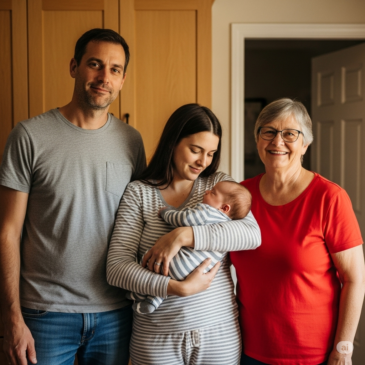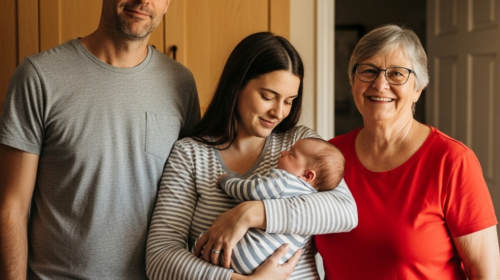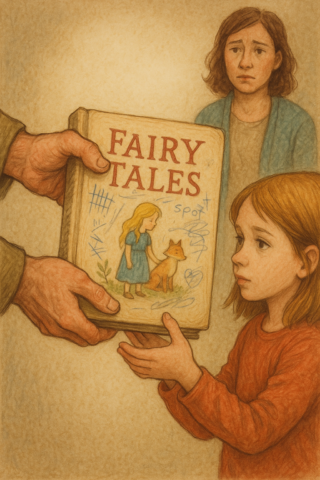The afternoon we first brought little Asher home, it felt like sunlight had poured directly into our lives.
My mom and dad were teary-eyed with happiness. Liam’s folks arrived with a feast, and his mother, Vivian, even organized Asher’s impossibly small clothes, neatly folding them without a word—as if to silently promise her full support.
I genuinely believed we were incredibly fortunate. I thought this was just how welcoming a new baby into the family went.
Vivian lingered for a couple of weeks, saying she was there “to lend a hand.” But, little by little, the way she spoke about Asher began to subtly shift.
“This little treasure was truly meant for me,” she’d murmur, half-joking, yet with an edge I couldn’t quite place.
Or, “You really should get some uninterrupted sleep. Let me keep him tonight—he’s always so much calmer when he’s with me, anyway.”
It sparked a flicker of unease in me, but I pushed it aside. Probably just my hormones settling. The exhaustion. Maybe I was just being overly protective, a new mom’s classic worry.
Then came the morning I woke up to an empty bassinet.
A wave of sheer panic washed over me. Liam shot out of bed, rushing down the hall, only to find Vivian downstairs, gently rocking Asher as if nothing out of the ordinary had occurred.
She explained, “You were sleeping so soundly, darling, I just couldn’t bring myself to wake you. He was a little restless.”
But the baby monitor was off. And the nursery door was quietly, intentionally closed. It wasn’t a simple oversight. It felt…calculated.
I told Liam then, plainly, that I wasn’t comfortable with his mother being here anymore. That I desperately needed some breathing room from her.
He nodded, but there was a visible hesitation in his posture. “She’s only trying to be helpful,” he reasoned. “You know how she can be. A bit intense, but always with the best intentions.”
I didn’t argue. Not at that exact moment. I was just too utterly drained.
The very next day, she cooked an elaborate dinner. She produced children’s storybooks from Liam’s own childhood. She started arranging the nursery with decorations I hadn’t chosen, items that definitely weren’t my style.
When I gently mentioned I envisioned a serene, minimalist space for Asher, she chuckled. “Oh, sweetie, babies thrive on color and excitement! You’ll catch on.”
The way she delivered that last phrase—you’ll catch on—it stung. It felt condescending, as if I were a child myself, completely clueless about what was best for my own son.
I started discreetly locking the nursery door at night. She noticed, of course. “Are you truly afraid of me?” she inquired, her brow furrowed with a feigned hurt.
“I just need to ensure I get uninterrupted rest,” I replied, forcing a fragile smile.
She pressed her lips into a thin line but didn’t push it further. That evening, I reiterated to Liam, more firmly this time: “She has to leave.”
He looked utterly torn. “Just give her a couple more days,” he pleaded. “She really does mean well. And she has been a lot of help…”
But it wasn’t “help” if it left me feeling constantly on edge, paranoid, and utterly exhausted in a different, more profound way.

On the tenth day of her stay, I caught her taking a photo of Asher with her phone, whispering, “Soon, my sweet. Soon.”
I immediately confronted her. “What exactly are you talking about?”
She startled, dropping her phone slightly. “Nothing! I was just—being silly. You know how I chatter to myself.”
But there was something in her eyes that wasn’t silly at all. It felt like a subtle warning.
I called my own mother. She arrived the following afternoon. Vivian was polite, but her demeanor was undeniably frosty.
My mom, ever astute, picked up on the coldness in Vivian’s tone. “You need to reclaim your sanctuary,” she quietly advised me.
That night, I told Liam with unwavering resolve, “I need her gone by tomorrow.”
He didn’t argue this time. I think, deep down, he had seen the signs too. He just hadn’t wanted to fully acknowledge them.
Vivian packed her belongings in tense silence. At the front door, she leaned down, kissed Asher’s forehead, and murmured something I couldn’t quite catch.
Then she looked directly at me—calm, almost chillingly self-satisfied. “You’ll live to regret this decision,” she stated. “Some women simply aren’t cut out for motherhood.”
I was trembling, but I didn’t utter a single word in response.
Weeks bled into months. Slowly, steadily, life began to return to a semblance of normal. I fully immersed myself in bonding with my son. We found our own easy rhythm.
Liam apologized more than once for not intervening sooner. We even started going to a few counseling sessions to work through everything. We talked about boundaries, about trust. It truly felt like we were beginning to heal.
Until the letter arrived.
It was official. Legal. From an attorney’s office.
Vivian had filed a petition to legally adopt our son, Asher.
The envelope slipped from my trembling fingers. My heart felt as though it had completely detached from my body.
She claimed I was “mentally unstable,” that I was suffering from such severe postnatal distress that I posed a danger to my own child.
She had written that she had “been the primary caregiver since birth” and that she was “the only stable parental figure in the baby’s life.”
I couldn’t comprehend it. I couldn’t even breathe.
Liam was absolutely incandescent with rage. “She’s completely lost her mind,” he roared.
We immediately secured legal representation. A truly excellent lawyer. We compiled every piece of evidence: documents, text messages, videos, even statements from my obstetrician and Asher’s pediatrician, all confirming I was a perfectly capable and loving mother.
But Vivian was meticulously prepared. She had detailed notes. Photos. Videos she had secretly recorded—of me looking tired, crying, even that one instance where I’d accidentally fallen asleep while holding Asher.
It looked damning. But it was far from the whole picture. I was a brand new mother. Of course I was exhausted. I was simply human.
Still, it shook me to my core. The court date was set for a month away. In the interim, Vivian requested immediate visitation rights.
I vehemently refused. Our lawyer agreed. “Let them see she’s being aggressively unreasonable,” he advised. “This will only strengthen our position.”
But it didn’t feel like a calculated legal strategy. It felt like a profound betrayal. This woman had attempted to snatch my child from my embrace, and now I was expected to remain calm, to smile politely in court, and just hope that someone, anyone, would see the underlying truth?
I barely slept for weeks.
Then came the unexpected turn I never could have foreseen.
Vivian showed up at my workplace.
She marched into the reception area and brazenly informed the receptionist that she was there to collect her grandson. That I wasn’t well. That she was “taking over.”
My boss immediately called security. Vivian left just before they arrived. But the damage was already done.
My colleagues whispered behind their hands. Human Resources started asking pointed questions.
I brought in paperwork, desperately tried to explain the situation. Despite my efforts, I was formally advised to take “a mental health sabbatical” for the remainder of the month.
I went home. Held my baby close. And simply collapsed onto the floor, weeping.
And then, something inside me shifted. A clear, decisive click.
If Vivian was determined to fight dirty, then so would I. But I would do it legally. Smartly.
I started meticulously digging for information.
Old text messages. Facebook posts from years ago. Messages Vivian had exchanged with her friends. A distant memory surfaced—she had once casually boasted that she “would’ve had a third baby if her body hadn’t finally given out.”
That particular phrase had always stayed with me.
I unearthed her old medical forum posts. She had suffered a devastating late miscarriage in her early forties. She had written extensively about how she deeply believed she was “destined to have another child.”
She had explicitly stated that the loss had “shattered her sense of purpose.” That she had longed to raise another baby before she became “too old.”
It was undeniably heartbreaking—but it was also incredibly illuminating.
She hadn’t truly grieved her loss. Instead, she had dangerously redirected her unresolved grief onto my son.
My lawyer confirmed this revelation could change everything—if presented with extreme care. Not to launch a personal attack against her, but to clearly demonstrate her underlying motive.
We also had Liam take the stand. He bravely testified about her whispered comments, her possessive actions, her relentless attempts to control.
My mother also spoke, recounting the specific incident with the photograph, the unsettling “soon, my sweet” comment.
The judge listened intently. She clearly took our testimony very seriously.
In the end, the case was dismissed. Her petition was unequivocally denied.
The judge stated that Vivian’s actions showed “obsessive behavior and a deeply concerning lack of boundaries.” She added that Liam and I had gone above and beyond to provide a stable, loving, and nurturing home for our son.
But there was a lingering detail.
Vivian wasn’t charged with anything. No restraining order was issued. She received a stern warning—but she was otherwise free.
We relocated. Quietly. Changed our phone numbers. Took a complete break from all social media.
It took time, but gradually, life softened again. Asher started taking his first steps. He began to babble, then form words. His laughter filled our days with tiny, precious moments of joy that no one, ever, could take from us.
One quiet afternoon, many months later, a letter arrived in our mail. There was no return address.
Inside was a photograph of Vivian, holding a baby doll. The accompanying note was brief: “It’s okay now. I understand. Thank you for waking me up.”
There was no signature.
I didn’t know how to feel. Relief? Pity? Perhaps a complicated mixture of both.
We never heard from her again.
Now, three years on, Asher has just started his first year of pre-school. He doesn’t remember any of it. But Liam and I do.
We remember everything.
And we learned, with painful clarity, that family isn’t always solely about blood ties. It’s about respect. About healthy boundaries. About unwavering trust.
I used to feel a heavy weight of guilt about what happened. I’d wonder if I had somehow caused it. If I had been too distant, too defensive.
But now, I see it with crystal clarity.
Sometimes, people unwittingly project their own deep pain onto others. They grasp desperately at things that fundamentally don’t belong to them because they are hurting so profoundly inside. But that doesn’t, under any circumstances, make their actions acceptable.
It is absolutely not your responsibility to mend someone who is willing to inflict harm upon you.
I am profoundly grateful that we stood our ground. I am immensely grateful that I trusted my gut, that persistent, quiet voice inside me.
If you ever find yourself in a situation where someone’s affection feels suffocating—too tightly wrapped, too controlling—please, trust yourself.
Protect your peace. Safeguard your family.
And never, ever forget: your instincts are not a sign of weakness. They are your deepest wisdom, often disguised.



